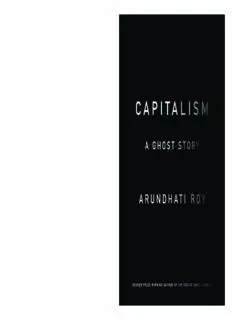
Capitalism: A Ghost Story PDF
Preview Capitalism: A Ghost Story
Capitalism Ghost cover_6_Layout 1 2/27/14 12:35 PM Page 1 F ROM THEpoisoned rivers, barren wells, and clear-cut forests, C to the hundreds of thousands of farmers who have committed A suicide to escape punishing debt, to the hundreds of millions of P people who live on less than two dollars a day, there are ghosts nearly everywhere you look in India. India is a nation of 1.2 billion, but the I country’s 100 richest people own assets equivalent to one-fourth of T India’s gross domestic product. A L Capitalism: A Ghost Storyexamines the dark side of democracy in con- I temporary India, and shows how the demands of globalized capitalism S have subjugated billions of people to the highest and most intense M forms of racism and exploitation. A v G H PRAISE FOR FIELD NOTES ON DEMOCRACY O S “Gorgeously wrought . . . pitch-perfect prose . . . In language of terrible beauty, she takes India’s T everyday tragedies and reminds us to be outraged all over again.” S T —TimeMagazine O R Y “In her searing account, Roy asks whether our shriveled forms of democracy will be ‘the endgame of the human race’—and shows vividly why this is a prospect not to be lightly dismissed.” —Noam Chomsky v A R U Arundhati Royis the author of the novel The God of Small Things, for N which she received the 1997 Booker Prize. She has also written several D H non-fiction books, including Field Notes on Democracy: Listening to A Grasshoppersand Walking with the Comrades. Roy is the recipient of T I the 2002 Lannan Foundation Cultural Freedom Prize. R O Y Current Affairs & Politics $14.95 www.haymarketbooks.org Capitalism text pages 8_all pages 2/26/14 3:50 PM Page i CAPITALISM A GHOST STORY Capitalism text pages 8_all pages 2/26/14 3:50 PM Page ii Capitalism text pages 8_all pages 2/26/14 3:50 PM Page iii CAPITALISM A GHOST STORY Arundhati Roy Haymarket Books Chicago, Illinois Capitalism text pages 8_all pages 2/26/14 3:50 PM Page iv First published by Haymarket Books in 2014 © 2014 Arundhati Roy Haymarket Books P.O. Box 180165, Chicago, IL 60618 773-583-7884 [email protected] www.haymarketbooks.org ISBN: 978-160846-385-5 Trade distribution: In the US, through Consortium Book Sales and Distribution, www.cbsd.com In Canada, through Publishers Group Canada, www.pgcbooks.ca Special discounts are available for bulk purchases by organizations and institutions. Please contact Haymarket Books for more information at 773-583-7884 or [email protected]. This book was published with the generous support of Lannan Foundation and the Wallace Action Fund. Cover design by Abby Weintraub. Printed in Canada by union labor. Library of Congress CIP data is available. 1 3 5 7 9 10 8 6 4 2 Capitalism text pages 8_all pages 2/26/14 3:50 PM Page v CONTENTS PREFACE The President Took the Salute 1 SECTION ONE Chapter 1: Capitalism: A Ghost Story 7 Chapter 2: I’d Rather Not Be Anna 49 Chapter 3: Dead Men Talking 57 SECTION TWO Chapter 4: Kashmir’s Fruits of Discord 69 Chapter 5: A Perfect Day for Democracy 77 Chapter 6: Consequences of Hanging Afzal Guru 83 AFTERWORD Chapter 7: Speech to the People’s University 93 NOTES 97 INDEX 113 Capitalism text pages 8_all pages 2/26/14 3:50 PM Page vi Capitalism text pages 8_all pages 2/26/14 3:50 PM Page vii Your blood asks, how were the wealthy and the lawinterwoven? With what sulfurous iron fabric? How did the poor keep falling into the tribunals? How did the land become so bitter for poor children, harshly nourished on stone and grief? So it was, and so I leave it written. Their lives wrote it on my brow. Pablo Neruda “The Judges”1 Capitalism text pages 8_all pages 2/26/14 3:50 PM Page viii Capitalism text pages 8_all pages 2/26/14 3:50 PM Page 1 PREFACE THE PRESIDENT TOOK THE SALUTE T he Minister says that for India’s sake, people should leave their villages and move to the cities. He’s a Harvard man. He wants speed. And numbers. Five hundred million mi- grants he thinks, will make a good business model. Not everybody likes the idea of their cities filling up with the poor. A judge in Bombay called slum dwellers pickpockets of urban land. Another said, while ordering the bulldozing of unau- thorized colonies, that people who couldn’t afford to live in cities shouldn’t live in them. When those who had been evictedwent back to where they came from, they found their villages had disappeared under great dams and dusty quarries. Their homes were occupied by hunger—and policemen. The forests were filling up with armed guerrillas. They found that the wars from the edge of India, in Kashmir, Nagaland, Manipur, had migrated to its heart. People returned to live on city streets and pavements, in hovels on dusty construction sites, wondering which corner of this huge country was meant for them. 1
